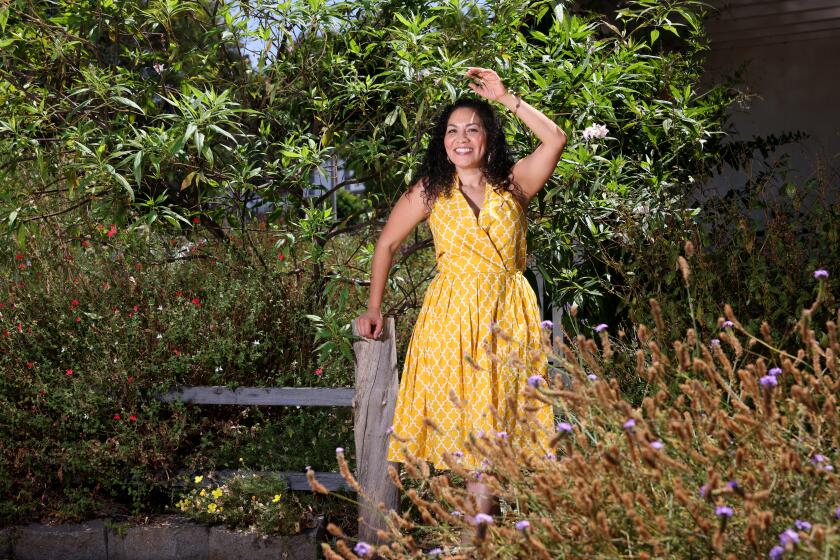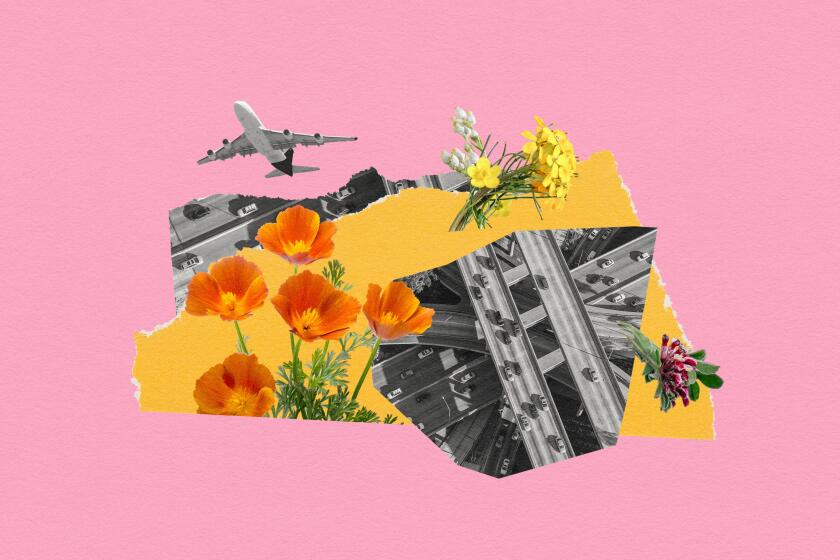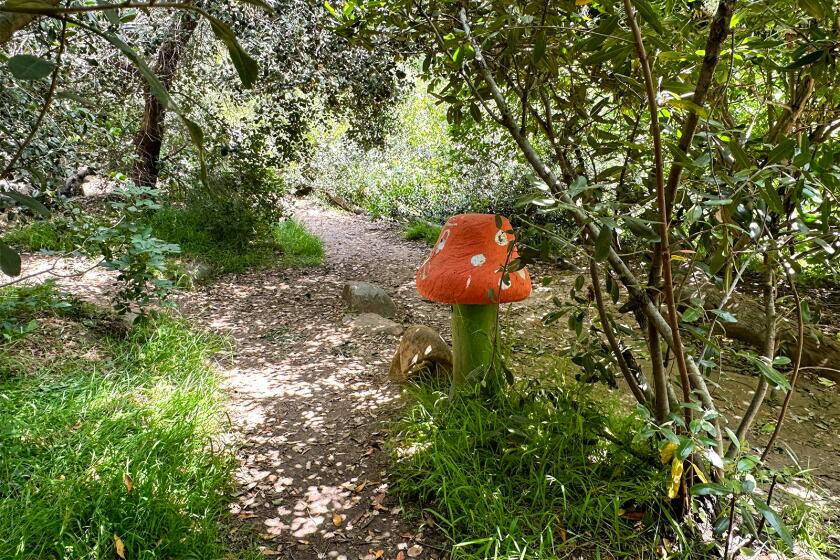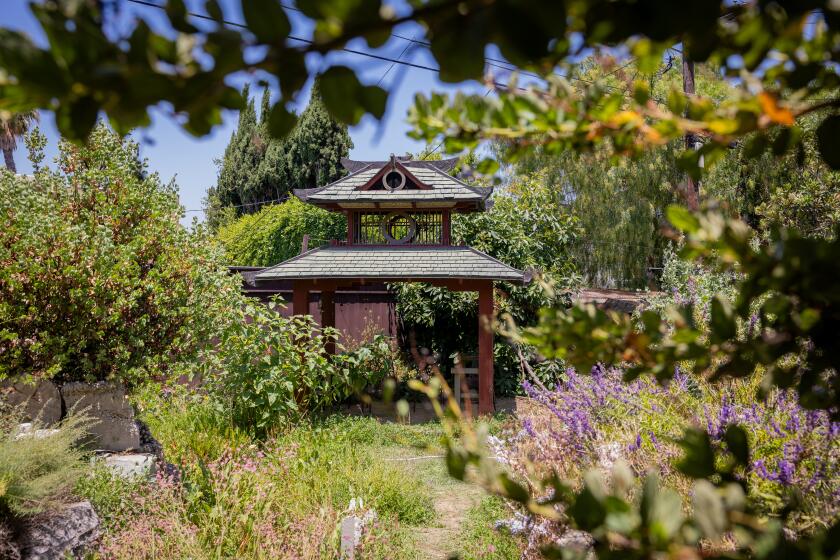Urban farm really grows on visitors and volunteers
After a hot morning of work, David Kahn and his farmhands sat down to lunch at a long wooden table on the porch.
Today’s feast featured a salad of juicy heirloom tomatoes picked from vines just a few feet away, pasta and pesto made with homegrown cilantro, and a crusty loaf of wheat bread baked the day before in an outdoor clay oven.
If there are any doubts about the viability of Edendale Farm — which Kahn built, improbably, on a sloping half acre smack in the middle of a swanky Silver Lake neighborhood — the mealtime menus should quell them.
The workers were chewing in silence Thursday, gazing happily out at the shady yard, when they noticed that something seemed off. The landscape was moving — and clucking.
Half a dozen hens had flown the coop and were now scattered about the farm, hunting worms.
“It’s a revolution!” cried Francois Feutrie, 27, an artist from France who with his girlfriend is volunteering on the farm in exchange for meals, showers and place to pitch a tent.
Kahn, 59, sighed and put down his fork.
“Let’s go, ladies,” he said, clapping his tan hands to shoo the birds back to their roost.
The rhythm of chickens, the ring of wind chimes, the spray of the garden hose — this is the tempo of life on Edendale Farm. Kahn founded it five years ago to show that a slower pace is possible, even in a metropolis like Los Angeles.
Kahn, who was born in Egypt and speaks with an accent, says he hopes the farm will teach people “there’s another way to live.”
A handful of urban farms have cropped up in the neighborhood in the last decade or so, including Silver Lake Farms. Kahn says he also knows of at least 15 families in the area who raise chickens in their backyards.
Still, when Kahn first persuaded his friends Louise and Jozef Bilman to let him tear up the elegant lawn behind their white Southern Revival home and replace it with planting beds, some neighbors were skeptical. When he added chickens to the mix, one woman worried the entire block might catch avian flu.
Five years later, the neighborhood has embraced the farm.
Parents take their children here to feed the chickens their favorite treat: pink flowers from the bougainvillea vines that grow like weeds. Other neighbors bake Kahn quiche in exchange for eggs. The farm occasionally hosts cooking lessons and by-donation yoga classes, and Kahn dreams of building a stage for bands and community theater.
For now, only the eggs are for sale. Most of the crops — which include carrots, mushrooms, passion fruit and sugar cane — go to feed the volunteers who help Kahn keep the operation running.
The food is grown organically, without pesticides, and is irrigated with gray water from the laundry machine and shower.
“Everything is a resource,” Kahn said. “Even our waste.”
One of his favorite books is “The Humanure Handbook.” Among his proudest accomplishments are two composting toilets.
A hand-lettered sign inside one of toilets reads: “Urine is the best fertilizer for tomatoes. Thank you for contributing to our tomatoes!”
The farm, like its farmer, is endearingly disheveled. It is strewn with rusting garden tools and scrap wood that might come in handy someday. Kahn has stains on his T-shirt and wears a baseball cap with a frayed brim.
In Los Angeles, he says, where the ideal of the single-family home and the single-passenger automobile still holds strong, people have lost their connection to one another.
“I know,” he said, “because I was one of them.”
For years, Kahn was an architect who lived in Malibu and helped supervise the construction of luxury resorts, including the San Francisco Ritz-Carlton.
But that life never felt quite right.
“I remember flying to Italy to buy marble and seeing half of it destroyed because it didn’t match perfectly,” he said. “There was so much waste.”
In the 1990s, he started traveling around the world to learn more about natural construction. He took classes on straw-bale building in Denmark and mud-brick construction in Egypt. Then he found out about permaculture.
A design principle coined in the 1970s, permaculture is a model for sustainable living that follows patterns found in nature.
Consider the “herb spiral,” which was Kahn’s first experiment on the farm. The spiral — a trellis that allows herbs that need sun to get it while simultaneously shading herbs that need cooler temperatures — was inspired by the principle that in the wild, different plants grow together for their mutual benefit.
“Now,” Kahn says, “I feel I’m doing something that is more constructive than destructive.”
The Bilmans have given Kahn, who lives in the bottom half of their house, free range to do what he wants with their yard. The antique lamppost that once lit their lawn is now a scarecrow with a button on its shirt that reads “zero waste.”
The Bilmans have also put Edendale Farm in a trust so that it will continue even after they — and Kahn — are gone.
The farm has already grown beyond them. Feutrie, the French artist, learned about Edendale at the website of World Wide Opportunities on Organic Farms, a network that connects volunteers with farms.
During breaks from farming, he and his girlfriend, Caroline Guittet, 26, work on an art installation around a palm tree in the middle of the farm. They’re using only objects found on the site. On Thursday, three kitchen chairs hung upside down from grooves in the trunk. They will exhibit their work with a party on the farm on Nov. 14.
Another volunteer, Emily Slezak, has been working as unpaid intern every day for the last two months. A recent graduate of USC, Slezak, clad in striped overalls, said working on the farm allowed her to better understand the way of life of her grandparents, who tended a farm in Arkansas. “These aren’t really new principles,” she said. “It’s just how we used to live.”
Edendale Farm gets many visitors. Some, like schoolchildren on class trips, are welcome. Others, like squirrels and gophers, are not.
On Thursday, as a regal elm tree shed golden leaves, a yellow convertible pulled up to the curb. Out hopped Allen Plone, 63, who handed Kahn two fluffy squash muffins made with eggs from Edendale Farm.
Plone, a screenwriter, drives 20 miles from his home in Playa Vista every two weeks to buy two dozen eggs from Kahn. Plone is a vegan, but his wife eats eggs and he likes to bake with them.
“There’s a richness to them, there’s a freshness,” he said. “And it’s a special treat to meet the chickens and meet the farmer.”
Kahn smiled.
“If you eat consciously, you realize there’s this enormous relationship between how something is grown and how it tastes,” Plone continued. “This is way better than some factory farm, where chickens are living on top of one another. That creates stress. Then you ingest the stress.
“Frankly,” he said, “I have enough stress in my life.”




